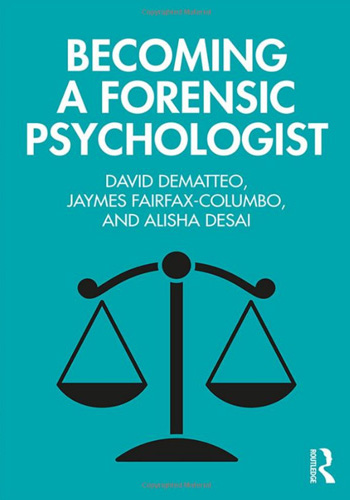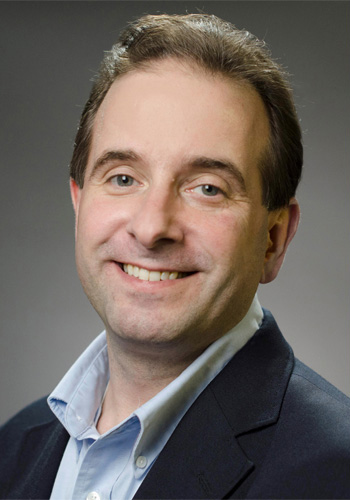How to Become a Forensic Psychologist
January 6, 2020

Aided by depictions in the media and popular culture, forensic psychology is a rapidly growing field. However, there are still many misconceptions about what it means to be a forensic psychologist — and how to become one. A team from Drexel’s Department of Psychology sought to address this lack of career guidance and widen access to the field in the new book “Becoming a Forensic Psychologist,” published by Routledge.
David DeMatteo, JD, PhD, ABPP, director of Drexel’s JD/PhD program, is a board-certified forensic psychologist who has published several studies on educational models within forensic psychology. He teamed up with Jaymes Fairfax-Columbo, JD, PhD, an alumni of Drexel’s JD/PhD in Law and Psychology program, and Alisha Desai, a candidate of Drexel’s PhD in Clinical Psychology (forensic concentration), for the project shedding light on forensic psychology career paths. Gain a primer to the subject here!

What is forensic psychology?
DeMatteo: Forensic psychology is the branch of psychology focusing on the intersection between psychology and law. Forensic psychologists can perform a range of activities, including conducting evaluations of criminal offenders and civil litigants in order to help courts answer legal questions (e.g., competence to stand trial, insanity, child custody), conducting research on psychology-law topics (e.g., reliability of eyewitness testimony, violence risk assessment), and consulting with attorneys and courts.
What motivated you to write this book?
DeMatteo: Despite the tremendous growth of the field of forensic psychology, information about how to become a forensic psychologist was not readily available to students and early career professionals. The paths to becoming a forensic psychologist are numerous and varied, so we wrote this book to provide insight into the process of pursuing a career in forensic psychology, from an introduction to the field itself to graduate school and beyond.
What are some of the barriers to entering this field? How have they changed in the past decade or more?
DeMatteo: Two of the biggest barriers to becoming a forensic psychologist are the lack of readily available information on how to enter the field and the limited number of training programs. We hope this book will address the first barrier. Regarding the second barrier, forensic psychology training programs are developing with some regularity, so students and early career professionals have many more options today than they had 20 years ago.
Any common misconceptions about the field?
DeMatteo: Yes! There are several pervasive misconceptions about the field of forensic psychology. The confusion surrounding forensic psychology stems from how the term “forensic” is used in movies, television shows, books, and the media. Over the past several years, use of the term “forensic” has become commonplace and there are quite a few portrayals of professionals who are labeled “forensic psychologists” in movies, such as “Silence of the Lambs” and “Manhunter,” and television shows, including “CSI,” “Bones,” “Law and Order,” and “The Profiler.” References to forensic psychologists in books, news articles, and Internet blogs are also becoming much more common.
The increasing attention paid to forensic psychology has generated interest in the field, but ultimately resulted in several misconceptions about the nature of forensic psychological work. Given the wide use of “forensic” these days in movies and on television, some prospective students mistakenly believe that forensic psychology involves collecting crime scene evidence or criminal profiling. “Forensic” means related to the law, which is why collecting crime scene evidence is indeed a forensic science (but not forensic psychology!), so forensic psychology is simply the application of the science and practice of psychology to the law.
What was the research process like for the book?
Fairfax-Columbo: “Becoming a Forensic Psychologist” was an intriguing writing project because — on the surface — it did not seem like a book that required much outside research. Rather, it was a book that was designed to encapsulate the firsthand experiences of individuals at three different levels in their professional training, assuming that their experiences were representative of the experiences of individuals more broadly in the field.
Though this likely holds true for individuals who have an interest in becoming licensed clinical-forensic psychologists qualified to conduct psychological evaluations for the courts, it does not necessarily hold true when considering the broader conceptualization of forensic psychology as anything which involves the overlap of law and psychology. For me, that was the most interesting part — trying to step out of my own experiences and think about what a career in law and psychology might look like had I taken a different pathway.
Desai: One of the unique aspects of writing “Becoming a Forensic Psychologist” was that much of the initial research involved firsthand experience I have gained over the past few years, from considering my options for graduate school to applying and interviewing to navigating the many opportunities available as a doctoral student at Drexel University and in the larger Philadelphia community. However, it was also important to remain cognizant of the fact that my approach is only one of a number of possible paths — some of which were news to me!
Conducting research for the book consisted of speaking with colleagues and professionals, consulting resources generated by established organizations in the field (e.g., the American Psychology-Law Society), and returning to some of the tried-and-true resources I frequented at earlier stages in my academic pursuits. Finding blogs and opinion pieces published online highlighted the value of early career professionals and graduate students themselves helping guide each other through these processes.
Do you have any anecdotes you’d like to share from your own experiences in the field of forensic psychology?
DeMatteo: The first time I was asked to testify in court was during my predoctoral clinical internship. I had conducted an evaluation with my supervisor, and the court subpoenaed me to testify. Testifying in court for the first time can cause some anxiety, so I was understandably a little nervous. When my name got called, I walked towards the witness stand, which required going through a small swinging gate that separated the attorneys and judge from the audience. I assumed the gate pushed forward — but it apparently needed to be pulled open — so I ended up doing a clumsy flip over the gate when I tried to push through it. Not a great way to start my testifying career, but definitely a memorable experience.
As a team consisting of a faculty member, doctoral candidate and an alumnus, can you discuss the role of mentorship in this career path?
Fairfax-Columbo: Mentorship is a critical component in becoming a forensic psychologist. Forensic psychology is inherently interdisciplinary, and it requires concurrently being a generalist in two fields while also being specialized to a specific type of psychological practice (forensic evaluation).
At times, the learning curve can feel overwhelming. You think you have an understanding of a topic, only to find it much more nuanced than you believed. You devise a system for approaching a specific type of evaluation question, only to find out it is inadequate in a particular case you encounter. The list of growth challenges individuals face in forensic psychological training are nearly endless!
For me, working with my mentor (Dr. DeMatteo) has helped me to navigate the steep learning curve and the numerous challenges — not necessarily always with poise and grace, but at least with sufficient balance so as not to fall on my face. Mentors can impart wisdom as to the state of the science regarding a specific topic, suggest a framework for conducting an evaluation, etc., but independent reading can accomplish the same. However, training students in how to think independently regarding psycholegal issues — and providing them support when they inevitably encounter the issues listed above, and then some — is the invaluable part of training only mentors are qualified to provide, and is vital for sustained success in the field!
Desai: Mentorship has been an instrumental aspect of my experience as a doctoral candidate. I attribute much of my achievements and successes thus far to the wonderful mentorship I have received along the way. Supervisors and peers are a tremendous source of support and guidance. In addition to simply educating us about the field and helping us develop clinical and research competencies, mentors support professional development and lead by example, providing real-world insight into what lies ahead at different stages of our careers and how best to navigate the many steps along the way. It is helpful to learn from the experiences of those who have come before you — and done so successfully — particularly when there are so many different paths to consider.
Interested in pursuing forensic psychology at Drexel? Learn more about Drexel’s forensic psychology research labs, related undergraduate psychology courses, and forensic psychology services provided by Drexel’s Psychological Services Center.